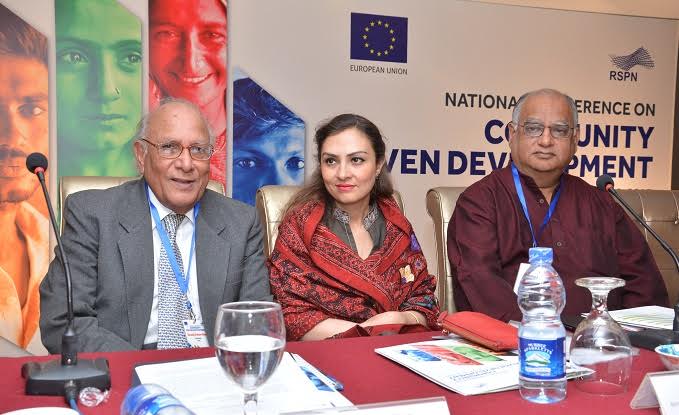ISLAMABAD – People should always be at the heart of the development process and basic needs of the communities can only be met if they are empowered to set their own development agenda, remarked Sartaj Aziz, Adviser to the Prime Minister on Foreign Affairs, speaking at a conference.
Addressing the participants at National Conference on Community-driven development, Mr Sartaj Aziz said Pakistan is well placed to plan for and to meet the newly agreed Sustainable Development Goals (SDGs). “Communities and people’s own organisations would be key stakeholders in efforts to meet these SDGs, especially poverty, health and education.”
The European Union (EU) and Rural Support Programmes Network (RSPN) organised a two-day National Conference on Community Driven Development (CDD), to emphasize the transformative approach of the Rural Support Programmes (RSPs) to local community driven development. The conference aimed at highlighting the work of organised local communities and its social and economic impact on poor. The conference concluded on Tuesday (December 8).
The conference was the final national level conference of a series of regional conferences organised earlier in Quetta, Sukkur and Peshawar. The objective of these CDD conferences was to drive attention of policy makers and broader stakeholders on RSPs’ approach of empowering local communities through social mobilisation and capacity development for enhanced social cohesion.
Mr Sartaj Aziz acknowledged the support of the EU for the rollout of the RSPs approach to Community Driven Development in Khyber Pakhtunkhwa, Balochistan and Sindh provinces.
He said through people’s own organisations, we could achieve transformative change that was equitable, productive, sustainable, environment friendly and gender sensitive, he remarked. He underlined that the RSPs’ approach to Community Driven Development has also been adapted and taken to scale in India, Afghanistan, Tajikistan, Myanmar, and through the Aga Khan Foundation in East Africa.
Marvi Memon, Chairperson of the Benazir Income Support Programme (BISP), said in her remarks that BISP was providing sustenance to the poor people, particularly women, of the society through supporting them in skill development and programmes of cash grants. Marvi said that they could only make long term difference through community driven development process and the government has plans to link their BISP interventions with CDD.
EU Ambassador to Pakistan Jean-François Cautain underlined that the Rural Support Programmes in Pakistan, with their 30 years long experience widely documented in their successes, have convinced the European Union to recognise the multiple opportunities offered by the social mobilisation approach, “A development from the bottom”. He said over the past five years, the European Union has increasingly worked with the RSPs, who were now EU’s main partner in rural development. The EU, so far, has committed EUR 350 million in rural development programmes over the last five years.
Highlighting the support of the government, he said RSPs would have not become such strong actors today, without a strong government’s commitment. “There is no sustainability without a Government in the lead,” he remarked.
Secretary Economic Affairs Division Tariq Bajwa said the United Nations adopted the 2030 Agenda for sustainable development, which included a set of 17 sustainable development goals (SDGs) including the commitment to end poverty in the world by 2030. Pakistan’s Vision 2025 also envisaged poverty alleviation and human development as a crucial driver of economic development and growth in the country, he said, adding that social mobilisation was a key for empowerment and human development was an approach that could completely change the development paradigm.
Earlier in his opening remarks Chairman RSPN Shoaib Sultan Khan, thanked Sartaj Aziz for his participation in the event and said that Sartaj Aziz has been the most ardent supporter of the Rural Support Programmes in Pakistan.
Quoting his mentor Dr. Akhter Hameed Khan, Shaoib Sultan Khan said that the Administrative Pillar (from President to Patwari) and the Political Pillar (from National Assembly to Village Councils) were not enough for economic and social empowerment of the rural poor of the country. He said Dr. Akhter used to advocate a Socio-Economic Pillar or a Social Pillar to complement the Administrative and Political Pillars to reach each and every rural poor household because poverty was at the household level and without economic empowerment of each household; poverty could not be eliminated.


